"Syria is keen on the success of Annan’s mission. Despite all circumstances, the state continues in its reform policy and that of confronting conspirators who are commanded by the foreign powers."
Somaya Ali
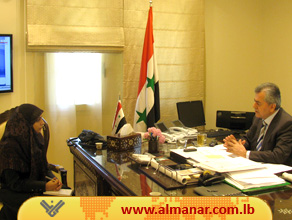 "I hope this interview won't exceed ten minutes," the Syrian Ambassador to Lebanon, Ali Abdulkarim Ali, asserted once we entered his office. What he demanded was out of reach regarding the recent events in Lebanon that are closely connected to the Syrian crisis. Ali, inflexible, serious, and strict, has to stay on the surface concerning the Northern events due to his diplomatic position. However, he was implying the intersection between the Lebanese security and that of his country. He also implied that the two countries will face the same fate in case the Lebanese leaderships didn't make firm positions and didn't save the army's prestige which may lead to the unknown.
"I hope this interview won't exceed ten minutes," the Syrian Ambassador to Lebanon, Ali Abdulkarim Ali, asserted once we entered his office. What he demanded was out of reach regarding the recent events in Lebanon that are closely connected to the Syrian crisis. Ali, inflexible, serious, and strict, has to stay on the surface concerning the Northern events due to his diplomatic position. However, he was implying the intersection between the Lebanese security and that of his country. He also implied that the two countries will face the same fate in case the Lebanese leaderships didn't make firm positions and didn't save the army's prestige which may lead to the unknown.
Q: Amid the increased bombings in Syria and targeting the members of the Observers’ Mission, to what extent still the bet on the success of the UN Envoy Kofi Annan's plan valid?
Ambassador Ali: Syria is keen on the success of Annan's mission. Despite all circumstances, the state continues in its reform policy and that of confronting conspirators who are commanded by the foreign powers. We should take notice of General Moode's statements, head of observers’ mission, who is reporting the events with high professionalism regarding the terrorist forces' role. Moreover, the observers’ team, although not in public, indicated that there are countries supporting those groups with weapons and ordnances, and are providing the media sponsorship. Diagnosing these situations is becoming clearer, and therefore Syria is beginning to adapt a clearer exit from this crisis, thanks to the unmasking of conspiracy faces in light of confiscating the smuggled arms ships which were supposed to enter the Syrian territories. The revelation of those facts has weakened the effectiveness of the conspiracy tools used against Syria, and we are still optimistic regarding Annan's plan.
Q: Some people consider that Syrian regime's enemies aim at exhausting the regime and weakening its potency via increasing bombings inside Syria. How would the regime confront the sort of such scenarios?
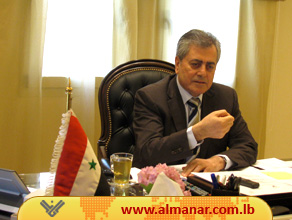 Ambassador Ali: The plan is definitely dangerous, multilateral, and has multi-targets. Therefore, it is very complicated with dangerous global forces. However, the Syrian immunity is growing faster. Terrible massive bombings that targeted many civilians as well as infrastructure, institutions, and the country's security and stability occurred, but it provoked patriotism among the Syrian people even those who used to stay quiet about what is going on. It may be due to the sense of danger that surrounded their lives and safety uniting them to confront such forces. In other words, those bombings unified Syrian people against terrorism. This was clearly witnessed through their considerable attendance in the latest elections despite all the means of mobilization and foreign intimidation. Although the bombings are terrible and dangerous, still is a must to optimistically view issues; Syria is paving its way to successfully exit this crisis through diagnosing cracks and the necessity to seriously remedy them leading Syria to extra power. The crisis also leaded Syria to diagnose its opponents, get introduced to its allies, and identify ambushes of strength and weakness as well; Syria will consequently overcome this adversity.
Ambassador Ali: The plan is definitely dangerous, multilateral, and has multi-targets. Therefore, it is very complicated with dangerous global forces. However, the Syrian immunity is growing faster. Terrible massive bombings that targeted many civilians as well as infrastructure, institutions, and the country's security and stability occurred, but it provoked patriotism among the Syrian people even those who used to stay quiet about what is going on. It may be due to the sense of danger that surrounded their lives and safety uniting them to confront such forces. In other words, those bombings unified Syrian people against terrorism. This was clearly witnessed through their considerable attendance in the latest elections despite all the means of mobilization and foreign intimidation. Although the bombings are terrible and dangerous, still is a must to optimistically view issues; Syria is paving its way to successfully exit this crisis through diagnosing cracks and the necessity to seriously remedy them leading Syria to extra power. The crisis also leaded Syria to diagnose its opponents, get introduced to its allies, and identify ambushes of strength and weakness as well; Syria will consequently overcome this adversity.
Q: Different international positions toward Syria were announced during the Camp David G8 summit. What does this reveal?
Ambassador Ali: These countries had reread the Syrian events and had a new vision about the path of the crisis. They are obliged to change their positions; it's not a matter of good manners. They took a deep bet, but they realized later on that Syria is strong with its institutions, army, and national unity. Therefore, their bet on quickly overthrowing Syria was wrong, and we will soon witness diplomatic economic encounter in which wrong bettors will be defeated.
Q: It was recently remarkable suggesting Mr. Faoruq Al-Sharaa, the vice-president, by the Arab League and the opposition to undertake the president's authority. What was meant to be from this approach that differentiates Al-Sharaa from the Syrian regime's entity?
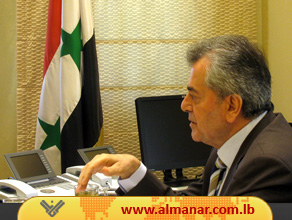 Ambassador Ali: It is a mean of intervention in the Syrian interior affair, but those people realized that the interior structure was further firmly connected than they did expect. Their access to the Syrian diplomatic body, the military institution, and the interior institutions was denied. National unity and the sense of the national side are precious values to Syrians. This mean was faced by an unprecedented high-level awareness.
Ambassador Ali: It is a mean of intervention in the Syrian interior affair, but those people realized that the interior structure was further firmly connected than they did expect. Their access to the Syrian diplomatic body, the military institution, and the interior institutions was denied. National unity and the sense of the national side are precious values to Syrians. This mean was faced by an unprecedented high-level awareness.
Q: Do you think that the videos broadcasted by some media outlets about assassinating certain Syrian personages, which was denied by the regime, would represent the first scene in a scenario that will target regime's personages?
Ambassador Ali: First of all, the plan to intimidate and invert truth is ongoing since the very beginning of the war against Syria, but those rumored lies were objected to cause confusion. I assume that this clearly showed their failure and frustration rather than their strength. Security and political sides are leading the action on the ground. And the specialized authorities in general are daily exerting great efforts to defeat several plans such as disabling booby-trapped cars and arresting roaming groups across the borders, some of which is announced by media and others are still unveiled.
Q: Since the beginning of the crisis, some people talked about a plan to assassinate President Basshar Al-Assad in order to destroy the regime and topple it thereafter. Did you abort a similar plan?
Ambassador Ali: In person, I have no accurate information about that. But what I and all observers and concerned about the Syrian affair know is that Syria and Mr. Al-Assad, the person of visions and positions, no doubt a personage like him will be a target of those who are looking for Syria, its role, and position. The person of vision and the reformative plan, the resistant of the American invasion to Iraq, and the first supporter to the Palestinian cause will definitely be a target of theirs.
Q: Mr. Ambassador, how would you describe your relationship with Hamas Movement after taking a seemingly hazy position toward the Syrian crisis, especially that the regime used to guard the movement and its leaders?
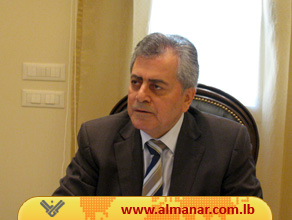 Ambassador Ali: We were, we are, and we will keep being with the Palestinian cause which is also ours. We support any Palestinian faction as much as it supports its cause. Therefore, we supported Hamas in its resistance to the Israeli aggression, and we will keep supporting all the resistive factions to this enemy. I prefer not to talk about other details. Much talk was said about the relations between Syria and Hamas, but the Palestinian resistance remains Syria's central cause, and we are keen on saving this resistance. We hope that whoever loses his vision will revise his stances to restore his right situation and position. We will be happy about that.
Ambassador Ali: We were, we are, and we will keep being with the Palestinian cause which is also ours. We support any Palestinian faction as much as it supports its cause. Therefore, we supported Hamas in its resistance to the Israeli aggression, and we will keep supporting all the resistive factions to this enemy. I prefer not to talk about other details. Much talk was said about the relations between Syria and Hamas, but the Palestinian resistance remains Syria's central cause, and we are keen on saving this resistance. We hope that whoever loses his vision will revise his stances to restore his right situation and position. We will be happy about that.
Q: Is what is taking place North Lebanon aiming at transforming the region into a posterior background to the armed Syrian opposition?
Ambassador Ali: The American Western Zionist plan targets Syria's role and position. When it failed to rapidly overthrow this role, it thought about all the possible means that indemnify its loss via transmitting arms, provoking armed groups, and developing expiatory thoughts. Syria is diagnosing what is going on and deeply reading it, therefore being keen on the progressive consultation with the fraternal country of Lebanon and other fraternal countries in order to learn that the region's security affects Syria's. We want Lebanon to be immune and soundly understand its role and position. Lebanon mustn't allow the explosion of arrogance on the Lebanese land because it will harm Syria before harming itself. We said since the beginning that Lebanon must take into account the governing agreements of fraternal relations with Syria not to be a base for targeting Syria and causing aggression against it. On this level, Lebanon is playing an irregular major role, but we know that seizing the smuggling networks, seizing the arms ship, and arresting a group of those who are involved in the interior Syrian events represent a good contribution to fortify inside Lebanon.
Q: Would Syria directly intervene in order to prevent more arm smuggling via the Lebanese Northern borders?
Ambassador Ali: Cooperation, contact, and coordination are ongoing between both the Lebanese and Syrian armies. For this reason, we wish that this coordination will lead to protective results for Lebanon, its land, and its fraternal relations, and preventive measures against those who are looking for Lebanon and Syria to use the North, Biqaa, or any borderline in order to back forces willing to destabilize Lebanese and Syrian security on many levels.
Q: Did you pre-learn about the presence of destructive groups in Lebanon as the one that was planning to assassinate the Lebanese parliament speaker Mr. Nabih Berri?
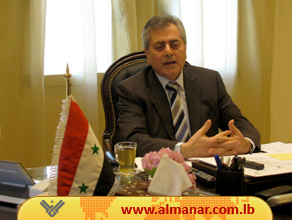 Ambassador Ali: We believe that Lebanese security officials are mainly responsible for this task. Some sides in Syria may be unaware about the presence of such groups. However, the embassy here is following up news with the Lebanese side. I am glad to be informed about any piece of information regarding any network that destabilizes Lebanese security. The early uncovering of those networks is a good step. I hope army's dignity will be protected since it represents the guarantee of the Lebanese sovereignty and security. We also hope that the dominants in this situation will be decisiveness, justice and transparency aloof some words of some Lebanese sides. Lebanese security concerns Syria and so shall be the Syrian.
Ambassador Ali: We believe that Lebanese security officials are mainly responsible for this task. Some sides in Syria may be unaware about the presence of such groups. However, the embassy here is following up news with the Lebanese side. I am glad to be informed about any piece of information regarding any network that destabilizes Lebanese security. The early uncovering of those networks is a good step. I hope army's dignity will be protected since it represents the guarantee of the Lebanese sovereignty and security. We also hope that the dominants in this situation will be decisiveness, justice and transparency aloof some words of some Lebanese sides. Lebanese security concerns Syria and so shall be the Syrian.
Q: In the course of the Egyptian elections, what is required from the president-to-be?
Ambassador Ali: Egypt is an essential country in the region. We hope that Egypt will find an exit to the state of confusion caused by foreign intervention. In addition, we hope that the popular movement that revealed the energetic side among Egyptians will end up saving national unity and the Egyptian golden role in defending Arab causes. This is all what is demanded from the forthcoming Egyptian president and the military institution that is supposed to protect Egypt's security.
Q: Are you willing to build good relationships with Muslim brotherhood in Egypt?
Ambassador Ali: We want from the Egyptian government and leadership to be jealous about Egypt's role and dignity, and to have a real view toward things as considering Israel the number one enemy. Therefore, we build our position toward any forthcoming government and any other forthcoming post on the base of its relation with central causes basically the Palestinian one.